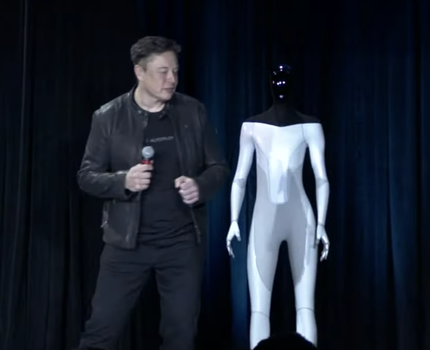Elon Musk’s brand is an implausible future — and it’s cheaper than advertising

Tesla announced a humanoid household robot Thursday, with a prototype due out next year.
It made headlines even though there was nothing to see but an actor in a suit. Elon Musk was just musing out loud with slides and silly props.
This is not new. Most of what Musk announces has no dependable release date, or is slipping. The Tesla Semi Truck, due this year, has been postponed to 2022. It’s the same for the its coyote ugly pickup truck, the Cybertruck, which was announced for 2021 and is now going to be ready in 2022.
Elon Musk has also announced fully autonomous driving software for its cars (not quite); “hyperloops” that promise fast, frictionless transit; underground tunnels as alternate transportation; flamethrowers; and now robots.
While the tunnels, hyperloop, and flamethrowers are not strictly speaking Tesla products, it all runs together in the public’s mind. Along with Elon Musk’s SpaceX plans for colonizing Mars, the point is to help us understand that he’s a wild genius.
Meanwhile, much of Telsa’s profit comes from selling bitcoin and regulatory credit. Its main activity, of course, is cranking out Telsa Model 3’s like the one I bought a couple years ago. They’re pretty nice cars, but except for software updates, they’re pretty close to what he was selling in 2017.
No one has ever made future fantasies into a brand — before now
There are plenty of productive R&D companies. Think of duPont and Bell Labs. But you don’t hear their names and immediately think “Those guys are inventing the future.” Even when their brand slogan is “Better things for better living [through chemistry].”
Companies like Microsoft have attempted to wrap themselves in the future, but had already established their brands in the present. We know Google/Alphabet has not just search and apps and maps, but divisions researching everything from ocean life to robotics. But we don’t think of it as being in the business of creating the future.
Steve Jobs, of course, was the ultimate showman of tech wizardry. But unlike Musk, he always shipped what he promised, soon after he promised it.
There are certainly think tanks like SRI and McKinsey and Forrester, but we know they sell advice and ideas, not product.
And there are individual futurists (some with institutes) like Kevin Kelley and Don Tapscott, but they don’t build things.
About the closest thing we’ve seen in the last forty years to Elon Musk’s out-there-in-the-future brand is Ray Kurzweil, whose companies produced innovative products even as he made futurist predictions. But he’s not really in the product business any longer.
The fuel for Elon Musk is outlandish product ideas packaged as if they are going to be launched. Some of them will be, some will never be, but that doesn’t matter.
When you buy a Tesla car, or home battery system, you are supposed to think you are investing in something designed with the future in mind and that whatever comes next will be close to the bleeding edge. That is a form of advertising, just as much as those sleek ads for other cars sweeping around hairpin turns on the edge of a mountain. You’ll never drive like that. And you most likely won’t live in Elon Musk’s oddball vision of the future.
But as you climb into your Model 3, it feels cooler if you imagine it that way.